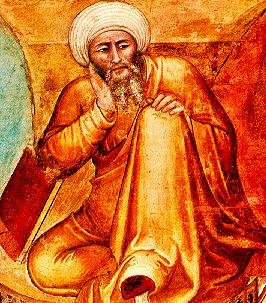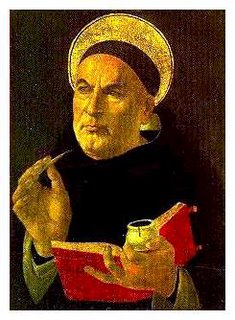
What can we, as individual believers, do in the wake of recent upheavals throughout the Muslim world? We can pray and work to bring about peace among all people in the circumstances of own lives. We should pray and work for mutual understanding and dialogue between Christians and Muslims, as well as between Christians and everybody else. Prayer is so important to the spiritual life that its importance cannot be overestimated. This point was even made clearer to me after a comment was forwarded to me for inclusion as commentary on one of my posts on l’affaire Paleologus. The quote was entirely unacceptable, which is why it was not posted. Neither the Holy Father’s comments nor my commentary are intended to insult Islam or Muslims. Both are a plea for the right use of reason, which leads to mutual respect and understanding, while recognizing the legitimate differences between us.
Neither Greek thought nor right reason (i.e., rationality) is foreign to Islam. In fact, Aristotle’s thought was largely preserved in Islam and reintroduced into the Christian West via Ibn Rushd, known better as Averroes. Averroes is quoted frequently by Saint Thomas Aquinas. In fact, in so high a regard is this Islamic thinker (i.e., Averroes) held by the Angelic Doctor (i.e., Aquinas), he is referred to by St. Thomas as simply "The Commentator," while the "The Philosopher" for Aquinas is Aristotle. Averroes' work on Aristotle is extensive. He wrote commentaries on most of Aristotle's works. The notable exception being Politics, to which he did not have access. Hebrew translations of his work also have had a lasting impact on Jewish Philosophy.
Aquinas
 Just as faith building on reason is not foreign to Islam, the misconstrual of God’s nature, primarily rooted in the nominalism of John Duns Scotus, especially among Protestant reformers "who," in he words of Ryan T. Anderson, "sought to create a Christianity untethered to philosophical truths of what they considered a 'foreign' [one thinks of Karl Barth] philosophical system." Benedict, in his lecture, said that such a misconstrual of God’s nature leads "to the image of a capricious God, who is not even bound to truth and goodness."
Just as faith building on reason is not foreign to Islam, the misconstrual of God’s nature, primarily rooted in the nominalism of John Duns Scotus, especially among Protestant reformers "who," in he words of Ryan T. Anderson, "sought to create a Christianity untethered to philosophical truths of what they considered a 'foreign' [one thinks of Karl Barth] philosophical system." Benedict, in his lecture, said that such a misconstrual of God’s nature leads "to the image of a capricious God, who is not even bound to truth and goodness."This leads us back to prayer, through which we open ourselves to God and experience God; his truth, goodness, and beauty. We pray for the recovery of an understanding of God, rooted in human reason as expressed in Greek Philosophy, which inheritance we share with Muslims who, along with us and the Jewish people, "adore the one God, living and subsisting in Himself; merciful and all- powerful, the Creator of heaven and earth, who has spoken to men" (Nostra Aetate, 3).
In today’s General Audience, the Holy Father, alluding to his lecture said:
"I spoke on the relationship between faith and reason. I included a quotation on the relationship between religion and violence. This quotation, unfortunately, lent itself to possible misunderstanding. In no way did I wish to make my own the words of the medieval emperor. I wished to explain that not religion and violence, but religion and reason, go together. I hope that my profound respect for world religions and for Muslims, who ‘worship the one God’ and with whom we 'promote peace, liberty, social justice and moral values for the benefit of all humanity'’ (Nostra Aetate, 3) is clear. Let us continue the dialogue both between religions and between modern reason and the Christian faith!"


No comments:
Post a Comment